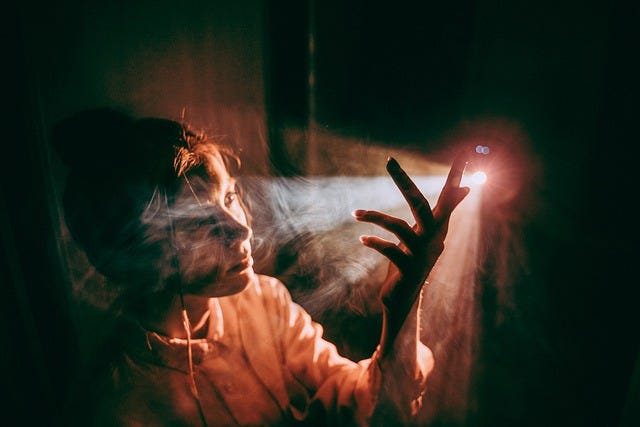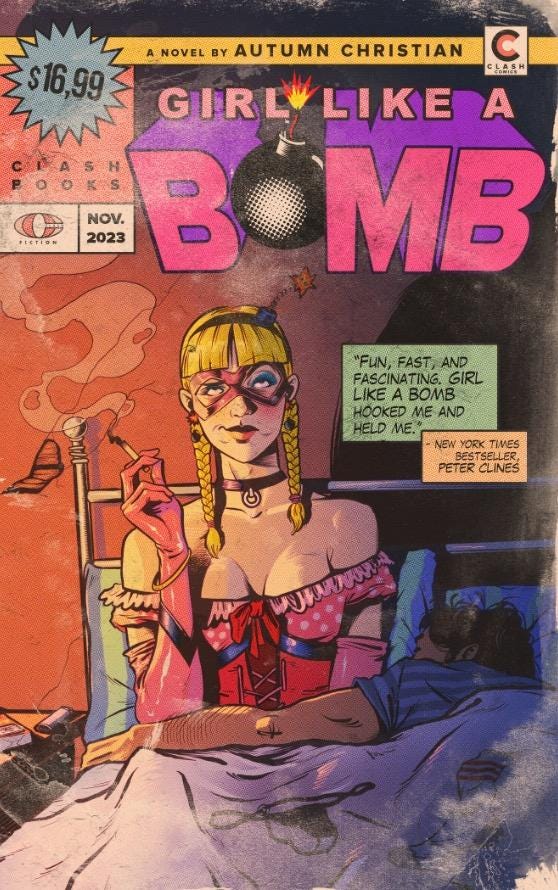The Gift of Sight
Escaping a painful, boring life
People cannot stand too much Reality.
Carl Jung
“The bottom line is that if you are in hell, the only way out is to go through a period of sustained misery. Misery is, of course, much better than hell, but it is painful nonetheless. By refusing to accept the misery that it takes to climb out of hell, you end up falling back into hell repeatedly, only to have to start over and over again.”
― Marsha M. Linehan
I tried to make myself look stupid. The first thing I did was pretend I didn't see.
I was too young to understand what I was doing, but instinctively I knew to protect myself I needed to appear dumb. I needed to deny the reality happening in front of me. I'd pretend I didn't hear when people told secrets in front of me. I'd act like I couldn't understand instructions. I'd see someone jeering and laughing at me, and I'd bury my head in my book, and let a fantasy bloom across my senses.
It worked. For years I became invisible, like I'd woven a spell to force people's eyes to skim right over my presence. I could be safe if I stayed below the threshold of notice, something so bland and ordinary it didn't warrant attention. I disappeared into the center of myself, with hunched shoulders and a tucked chin. I'd read Ray Bradbury from a young age and I agreed with him when he said we needed to stay drunk on writing or reality would destroy us. But I wanted to stay drunk on everything. I wanted to pull my bedsheets over my head and let the world spin away.
I didn't know at the time that this was called disassociation. I had done it for so long that it became my natural state of being. I thought it was normal to zone out during conversations or to lose memory of entire chunks of movies. I lost enjoyment in ordinary things. I didn't understand why people gushed about the beauty of nature. I cringed when people expressed excitement about birthday parties or good grades.
“Why are they so stupid?” I thought. Didn't they know it was dangerous to express emotion like that?
It's a testament to human ingenuity that we have the ability to mentally disconnect when we can't physically escape. Our minds peel away from the world, and our bodies remain behind, like little gray lumps, to take the pain we feel our minds can't contain. We can still manage to function, albeit non-optimally. This is good when you're in a long-term abusive situation or an intense and temporary one, like a car wreck or a violent assault. Sometimes we need to disengage from the intense pain in order to continue on and survive.
But the human brain isn't perfect. It likes routines and habits. Even long after the danger has passed, you can still continue to disassociate, especially if you've been doing It since you were a child. It's what you're familiar with, you've become comfortable in its numb safety.
You take in little sips of pain every day, hiding your eyes from any beauty because you think reality in all its rawness would destroy you.
I could have gone to the gates of heaven and not been able to appreciate its wonder. How can you enter paradise when you've trained your eyes to only see hell?
I got a somatic therapist when I was 26 years old, and we did a few simple mindfulness exercises to notice my heartbeat and the environment.
When I went outside, it was like I'd burst through a membrane. The sky was so vivid it hurt to look at. I could hardly breathe for the gasping and bright sensations of life all around me. My blood sloshed inside me, and I felt it rushing through my veins like diamond-encrusted shells of light.
I'd been surrounded by reality's raw majesty my whole life, but I'd done everything I could to dull its splendor in my eyes. I'd retreated into books, movies, and the gray film of my imagination so that life itself seemed pale through my weakened senses.
I didn't know how anyone lived without some level of disassociation. Reality seemed so huge and overwhelming. I thought if I gasped, it might scrape against my heart. If someone looked at me funny or said an unkind word, I feared the negativity might crush me.
I was stripped of my armor. All those years I'd spent building a calcified husk to hide inside, and now it was broken apart in a way that couldn't be repaired. I wasn’t sure if I’d survive.
But I could never go back to the gray palace of disassociation without knowing what I was doing and what I was missing. I couldn’t lie anymore and say that the reality I’d built inside of books, writing, games, and fantasies was a better one. It was a weak facsimile. I'd always know that I’d willfully lobotomized myself.
I’d turned myself into someone who spit in the face of beauty, but now, in the face of all its power, I wasn’t sure I’d survive.
Mindfulness is at the heart of Marsha Linehan’s therapeutic model, dialectical behavioral therapy. It’s also a big part of somatic therapy, which is designed to help people with trauma release tension and pain held in their nervous systems. Mindfulness is simply to be aware of yourself and the present moment. When we stop living so much in the present and past and start to experience the infinite reality of the present, we can learn to appreciate life again.
And once we can learn to walk in present reality, instead of hiding from it, we start to take more control over our life and realize what we can and can’t change.
Aleksandr Solzhenitsyn, the author of Gulag Archipelago, who spent ten years in a gulag himself, wrote, “Bless you prison, bless you for being in my life. For there, lying upon the rotting prison straw, I came to realize that the object of life is not prosperity as we are made to believe, but the maturity of the human soul.”
The pain convinced me that I would die if I let myself truly see, but I survived. My pale skin did not burn when exposed to sunlight. It became flushed and warm. If Solzhenitsyn could find truth and beauty inside of a Soviet prison, then I could find it in my life too.
Do you think you have a boring, awful life? Do you have a depressing, painful, repetitive, monotonous life? Is it full of debt, relationship pain, back surgeries, needy demands, and endless work?
Your life is also full of little wonders. It’s full of joy and humor and profound insights that glitter in the dark edges of your vision, waiting to be discovered.
Beauty is there if you train your eyes to see it.
The second edition of Girl Like A Bomb (With a new Epilogue) is now available! Grab it either on Amazon or on the CLASH website.




Life isn't good, but there's beauty in it. And maybe that's enough.
Thank you Autumn. Good post.